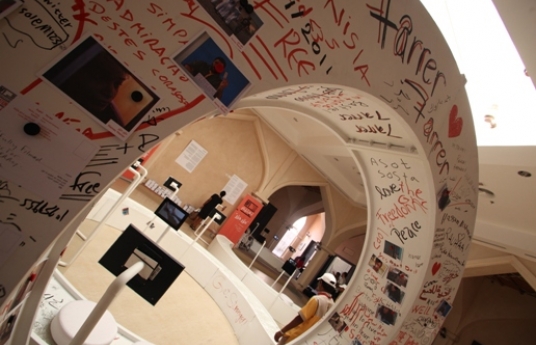‘Harrer Harrer’ Exhibition Captures the Spirit of Arab Spring
Oct 27, 2011 — Film Festival

Filmmakers Interact with Festival Attendees and Local Residents as they share Unique Experiences at Exhibition
Doha, October 27 – An exploration of this year’s Arab Spring through 50 video works created by filmmakers from Amman, Beirut, Cairo, Tunis, Ramallah, Jaffa, Marrakech, Khartoum and Doha launched at the Doha Tribeca Film Festival (DTFF) this week.
The exhibition, entitled ‘Harrer Harrer’ (Liberate, Liberate), includes a graffiti-style facebook wall where filmmakers, local residents and festival attendees can write, draw and share their personal perspectives of the one minute films on display, all of which capture the emancipative essence of Arab Spring.
Messages written on the wall, which is expected to become a permanent art exhibit in itself after the Festival, captured the high emotions and political activism of the Arab Spring.
“Free Syria”, “Refuse/Resist!”,“Pray for the People”, “Hope for Freedom Everywhere”, “Tunisia is Free – the First and Peace for Somalia”, “We Are All ‘Arabs” were just some of the impassioned and emotionally charged messages posted on the Exhibition’s wall.
Breaking with convention, the exhibition format is an innovative, interactive fluid installation which gives festival goers access to ‘mobile chairs’ in which they can literally slide side to side and between screens to view and experience the short films.
The Exhibition was unveiled at Katara Building 5 yesterday and runs until mid-November. Egyptian actor, Khaled El Nabawy inaugurated the Exhibition,and gave aninspirational speech praising the works of the young filmmakers who participated in the program.
“I feel very proud here standing between 48 different new directors, each presenting his first film about the Arabic revolutions, hoping that they meet what they dreamed about in their films, in reality. And I feel grateful towards the education department at the Doha Film Institute (DFI), and the head of it, ScandarCopti, for providing this rare opportunity for these directors.”
El Nabawy, who was a vocal participant in the recent revolution in Cairo added: “I feel proud today, talking about liberation, as I have just comefrom Tahrir Square [in Cairo]. This square has become a symbol of Pride and dignity. I also feel proud to be from the Arab world.”
Explaining the reasoning behind the exhibition, Head of DFI Education, Oscar-nominated filmmaker ScandarCopti, said: “Through ‘HarrerHarrer” we wanted to facilitate the expression of Arab storytellers, to ensure that their viewpoints were captured and shared in such an important part of the region’s history. It has been a tremendously inspiring process and what has resulted are some truly insightful and diverse works. Individually and collectively, the films provide a snapshot of the Arab World this year, and I think people will really appreciate the creativity that has been unlocked and enabled.”
Talking about the physical structure of the exhibition, Copti explained that the idea was to create interaction between the directors and visitors and between the visitors themselves as they can send postcards to the directors and write messages to them on the wall:“The whole idea is that the visitor himself is building his or her own narrative as they are the curators of their exhibition experience.”
Other artists and industry VIPs attended the exhibition yesterdayand were given a guided tour of the video installation. Luminaries in attendance included: Oscar-nominated Palestinian director, Hany Abu-Assad;cinematographer Christopher Doyle; actor James Cromwell; Palestinian filmmakerSuhaArraf;Egyptian filmmaker Ahmed Atef;Syrian filmmaker SammyChelkhes; and Qatari and Egyptian participants of ‘Harrer, Harrer’.
Each film – all fictional and themed around sociopolitical, cultural and personal liberation – was made in a single location following a week-long DFI Education workshop, which saw participants pitch their ideas, hone their concepts and work various roles behind-the-camera to create introspective one-minute films.
From the political to the personal, the project’s definition of ‘liberation’ was broad and the participants’ responses diverse, encompassing themes such as the Arab Spring, female emancipation and religious freedom, amongst others.
Having already attracted significant attention from film festivals, galleries and museums around the world, plans are now afoot to take the Exhibition on a global tour.
Plans are also being explored to make the ‘Harrer, Harrer’facebook wall a permanent art exhibit in Doha once the exhibition closes.
For additional information relating to Festival screenings, tickets, venues or transportation please visit: https://www.dohafilminstitute.com/filmfestival.
About Doha Film Institute (DFI):
The Doha Film Institute (DFI) is an independent cultural organisation established in 2010 to incorporate Qatar’s film initiatives under one banner.
Located at Qatar’s new cultural hub, Katara, DFI’s many initiatives include film and television funding for MENA and international films, year-round education programs, film screenings, and the annual Doha Tribeca Film Festival (DTFF).
In addition, DFI has established a number of strategic cultural partnerships with leading local and international organisations including Katara Cultural Village Foundation, Tribeca Enterprises, World Cinema Foundation, Maisha Film Labs and Giffoni Film Festival.
DFI was founded by H.E Sheikha Al Mayassa bint Hamad bin Khalifa Al-Thani. Along with Her Excellency, DFI leadership comprises DFI Board Vice-Chair and Festival Board Chair, H.E. Sheikh Mohammed Bin Fahad Al-Thani; DFI Board Member and Festival Board Vice-Chair, H.E. Dr. Hassan Al-Nimah; DFI Board Member, Mr.Mansoor Ibrahim Al-Mahmoud; Festival Board Member, H.E. Sheikh Jabor Bin Yousuf Al Thani; and DFI Executive Director, Amanda Palmer.